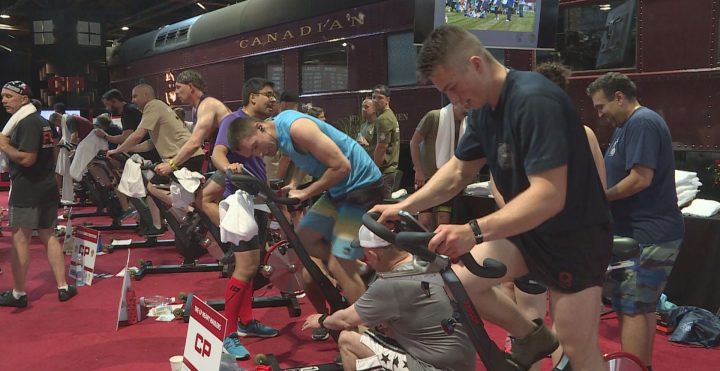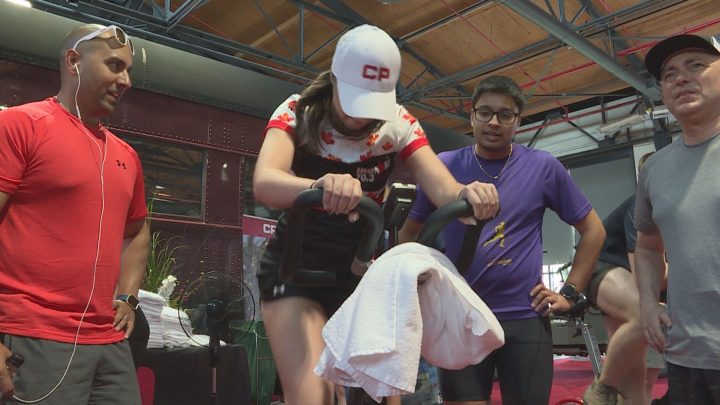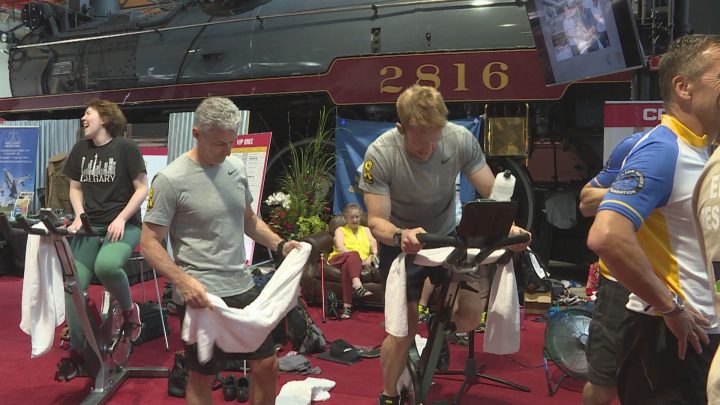Cyclists pedalled hard for 24 hours on the weekend in Calgary, raising awareness and more than $400,000 for homeless veterans, according to organizers.

Eighteen teams packed the Canadian Pacific Headquarters for the third annual Spin for a Veteran, competing to see who could cover the most distance before the event wrapped up on Sunday — Canadian Armed Forces Day — at 2 p.m.
Money raised goes towards Homes for Heroes, a Calgary charity that builds houses for homeless veterans.
As the manager of diversity and military relations at Canadian Pacific Railway, Rory Thompson’s job is to help veterans find employment after they’ve served in the forces.
It can be challenging for some vets to readjust back to everyday life and feel engaged in society.
“After they’ve left the military, they’ve left their camaraderie of their colleagues, they’ve left the military support network, and ultimately, it goes downhill from there for some people,” Thompson said.

Get breaking National news
“I’m ex-military myself and had a very successful, easy transition from the military into life… So I wanted to give back,” he added. “Ultimately, I went to sit on a spin bike for 24 hours and raised some money and awareness for homeless veterans.”
That concept grew into Spin for a Veteran — it’s been gaining money and momentum ever since, Thompson said.
“Everyone here today has been giving their hearts out on both the bike and on the fundraising side as well,” he said.
David Howard, president and co-founder of Homes for Heroes, explained that the company is setting up tiny home villages with resource centres across Canada for homeless veterans.
There will eventually be 15 homes in Calgary’s Forest Lawn neighbourhood and 20 in Edmonton. Then the program will expand into Ontario, Nova Scotia and B.C.
The average cost to build one home is $100,000, with each one being named after a fallen Canadian soldier.
“The whole goal here is to help our vets that are living on the street get off the street into a stable environment, get them the support they need, whether that be medical, emotional, psychological, whether that be retraining, and then back on their feet, integrate into civilian life and then our new veteran moves in,” Howard said.
There are thousands of homeless vets across the country, Howard said.
“Men and women that stood on guard for Canada that have come back and they’re broken. Majority of them are suffering from post-traumatic stress,” Howard said.
“They end up leaving the family unit for the safety of their family; they don’t want their husbands and their wives to see them like this, or their kids. So they depart the family unit, they end up on the street, and now we need to pay back what they’ve given to us.”





Comments
Want to discuss? Please read our Commenting Policy first.